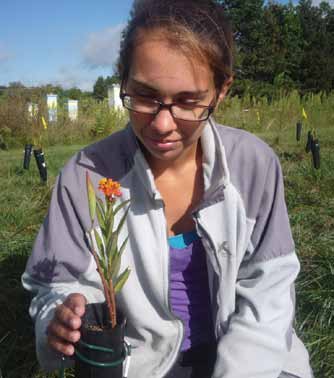Forsyth Middle School
On March 17th, budding young scientists learned why some caterpillars are brightly colored while others use camouflage to hide from their parents. Over 300 members of the public visited during the course of the afternoon.


Huron High School Workshop
On October 13, 2017, Amanda ran a workshop for approximately 50 AP Biology students from Huron High School. The students learned about mycorrhizal fungi, plant defenses, and insect herbivores through hands-on activities. Students then developed their own research questions and hypotheses related to mycorrhizal fungi and their ecological effects.



Spreading the Word at MSU
On September 28th, Amanda offered a class as part of the Evenings in the Garden Program at the Michigan State University Extension Tollgate Farm and Education Center. Amanda’s class was called The Secret World of Plants: Exploring the invisible among microbes, plants, and insects in your garden. 

Through a series of examples and hands-on activities, attendees explored the unseen interactions taking place in their gardens every day and learned how to optimize these interactions to improve the health and productivity of their gardens. The class incorporated a range of topics, including how soil microbes help plants grow and defend themselves, how plants defend themselves against enemies and respond to attack, and how plants communicate with each other and with insects using volatile scents.
The Far-Reaching Effects of Soil Fungi
On November 21, 2016, Amanda gave a presentation to the Huron Valley Chapter of the Michigan Botanical Club to a rapt audience at the Matthaei Botanical Gardens. Her talk was entitled “The far-reaching effects of soil fungi on plant-insect interactions.” Amanda discussed the important role that mycorrhizal fungi play in mediating interactions among plants, insect pests, and their predators aboveground. She began by reviewing her own doctoral research at the University of Michigan on milkweed plants. She concluded with comments on why we should all care about the mycorrhizal fungi in our own natural landscapes.
Huron High School AP Biology Students Discover Tri-Trophic Interactions
On October 13, 2016, Amanda ran a program for 70 AP Biology students from Huron High School about ecological research at the Matthaei Botanical Gardens. The students participated in hands-on activities to learn about mycorrhizal fungi, plant defenses, and insect herbivores. The students then developed their own research questions and Amanda shared the results of her doctoral research.
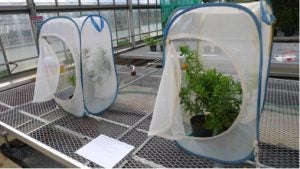
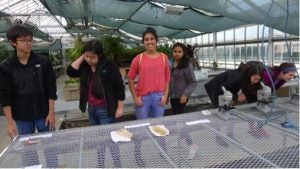
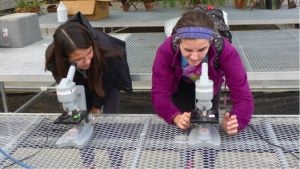
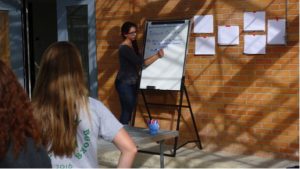
Earth Week-Plus Expo at Cheboygan High School
On April 23, 2016, Leslie participated in an Expo at Cheboygan High School to celebrate Earth Week. Leslie worked with students and members of the public to describe the interactions between monarch butterflies, their protozoan parasites, and milkweed plants. To explore some of the decisions that monarch mothers have to make, students were invited to “pin an egg on the milkweed.” Some plants have higher levels of toxins, which can make monarchs grow more slowly, but also help to protect monarch offspring from their parasites. So what’s a mom to do? Students got to see what their decisions might mean for the well-being of monarchs, and how those decisions might vary under global environmental change.
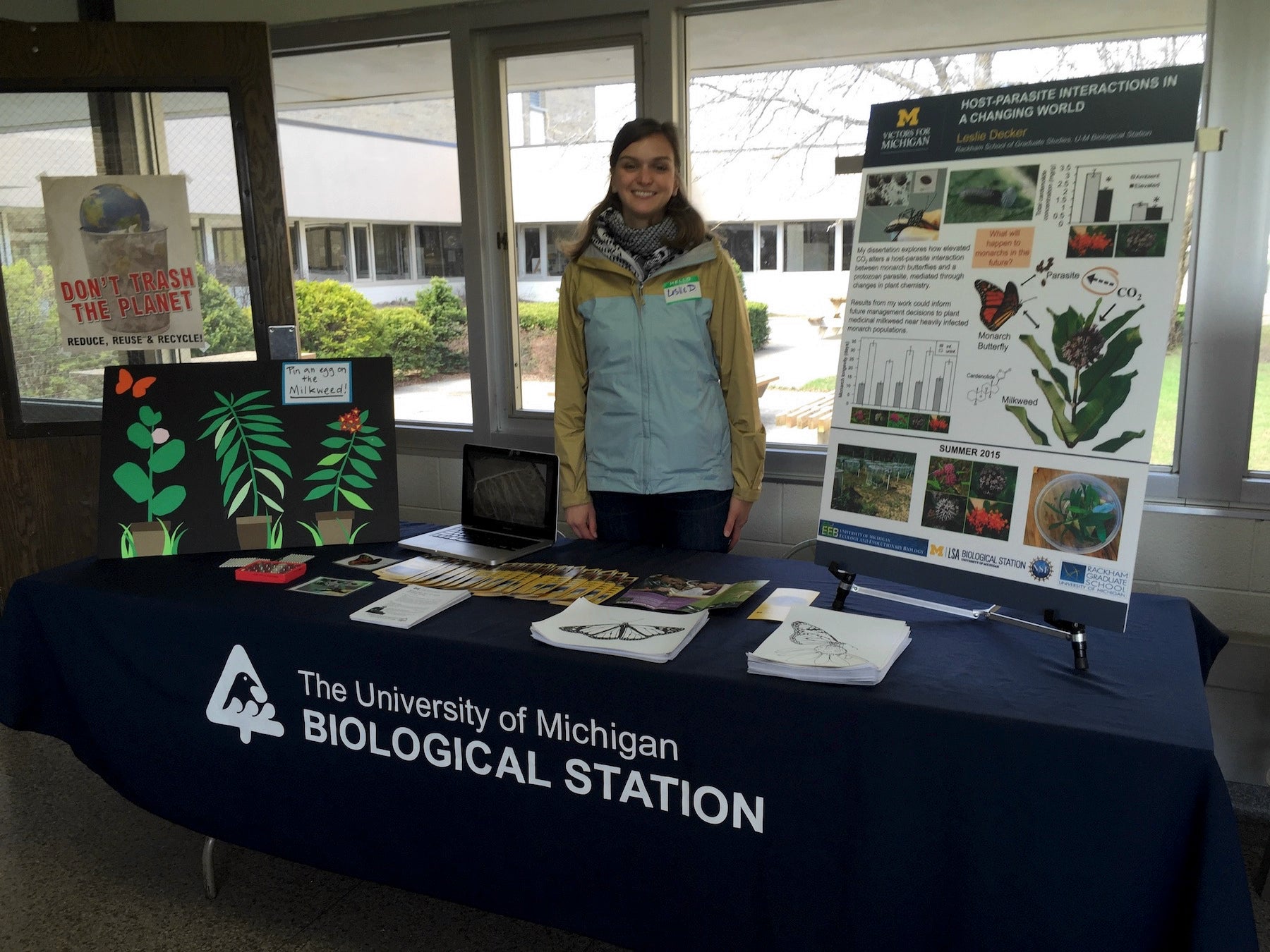
Amanda Leads a Trip Below Ground
On March 6, 2016, Amanda Meier gave a talk at the annual Wildflower Association of Michigan meeting in the Kellogg Center of Michigan State University. Her talk was titled “The Far-Reaching Effects of Soil Fungi on Plant-Insect Interactions.” Amanda discussed how beneficial soil fungi, such as mycorrhizal fungi, can have extensive effects on plants and insects above-ground. Mycorrhizal fungi associate with over 80% of all plant species and provide plants with nutrients in exchange for sugars from the plant in a mutually beneficial relationship. Amanda discussed the important role that mycorrhizal fungi play in interactions among plants, insects, and the predators of insects above-ground. She reviewed her research at the University of Michigan on milkweed (Asclepias) species and their insect herbivores, including monarch caterpillars and aphids. She concluded with comments on why we should consider mycorrhizal fungi in our own natural landscapes.
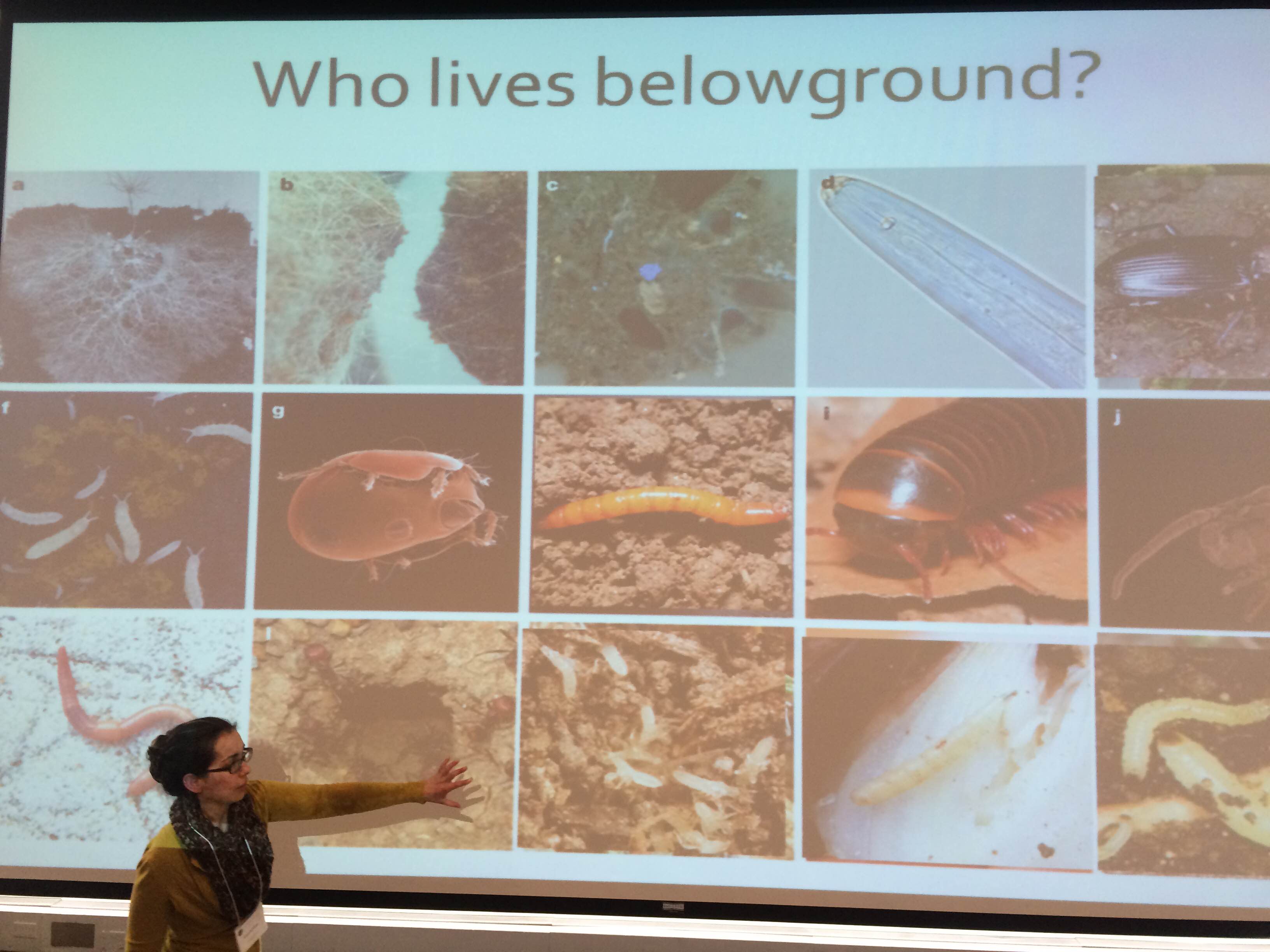
SEMBA Again
On February 17, 2016, Mark gave an update on monarch butterfly research to the Southeast Michigan Butterfly Association. This was Mark’s third talk to the group, and focused on the lab’s recent research on global environmental change. Mark described how changes in atmospheric CO2, temperature, and water availability influence the chemistry of milkweed plants. In turn, milkweed chemistry mediates the interactions between monarchs and their protozoan parasites. Mark compared the magnitude of these atmospheric and climatic effects with the more pressing problems of habitat loss and declines in the availability of milkweed. Mark concluded by providing some suggestions on how members of SEMBA might contribute to the conservation of monarch butterflies.
Science Cafe
In November of 2015, Leslie Decker and Mark Hunter hosted a Science Cafe in downtown Ann Arbor. We talked about monarch butterflies, environmental change, and medication behavior.

Yak’s Corner in the Detroit Free Press
Work by Amanda Meier and Leslie Decker is featured in Yak’s Corner, the Michigan Kids section of the Detroit Free Press that tells kids about science. Amanda reports on the interaction between milkweed plants and their fungal partners. Leslie’s work on milkweeds, monarchs and CO2 is also featured. You can read the full article here.
Future U Workshops
During 2014 and 2015, our lab has held workshops through the U-M Center for Educational Outreach for middle-school students from Ann Arbor and surrounding towns. Our workshops are designed to educate and excite students about potential careers in Biology. During our workshops, students have the opportunity to tour our lab, spend time with monarch butterflies, and design and carry out their own experiment to bring home with them.

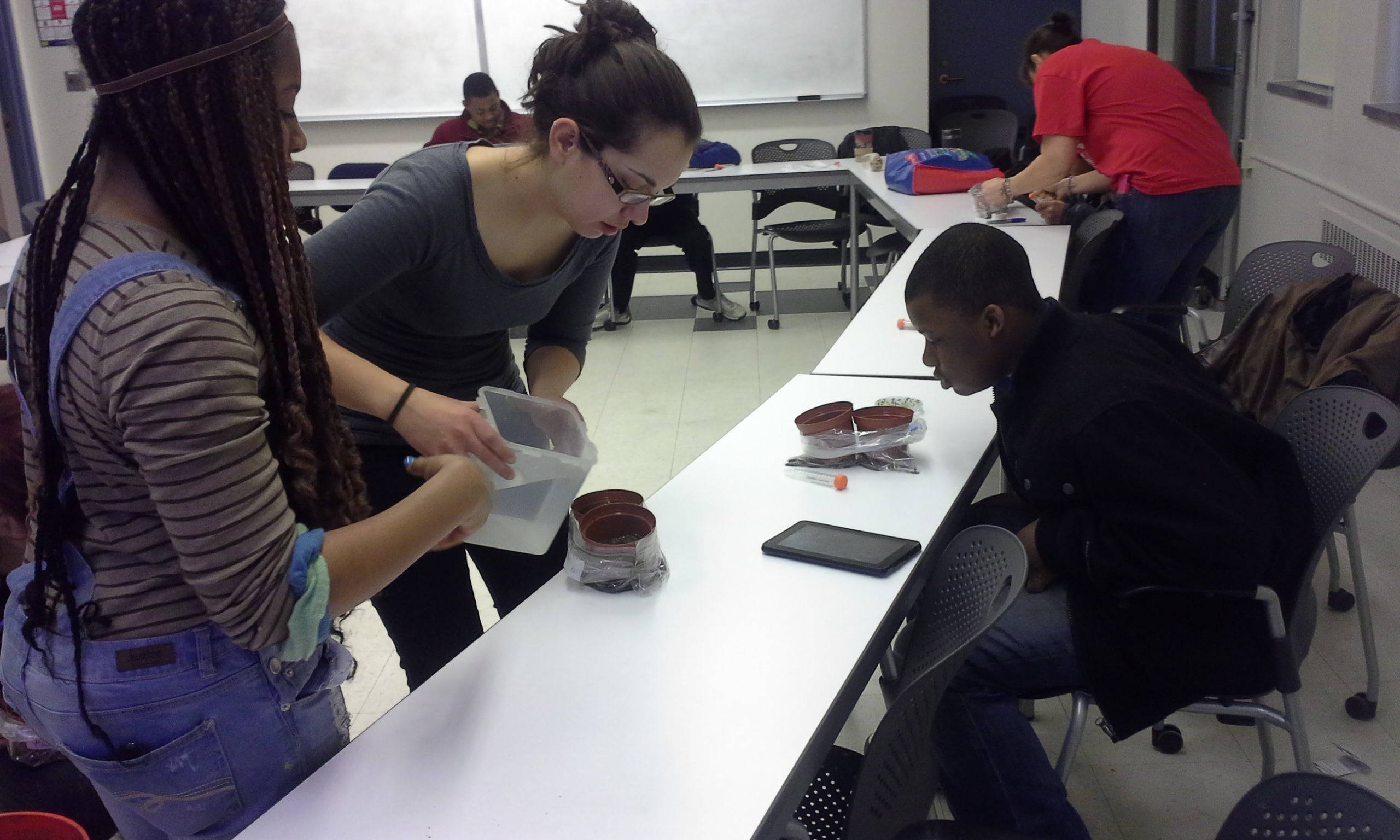
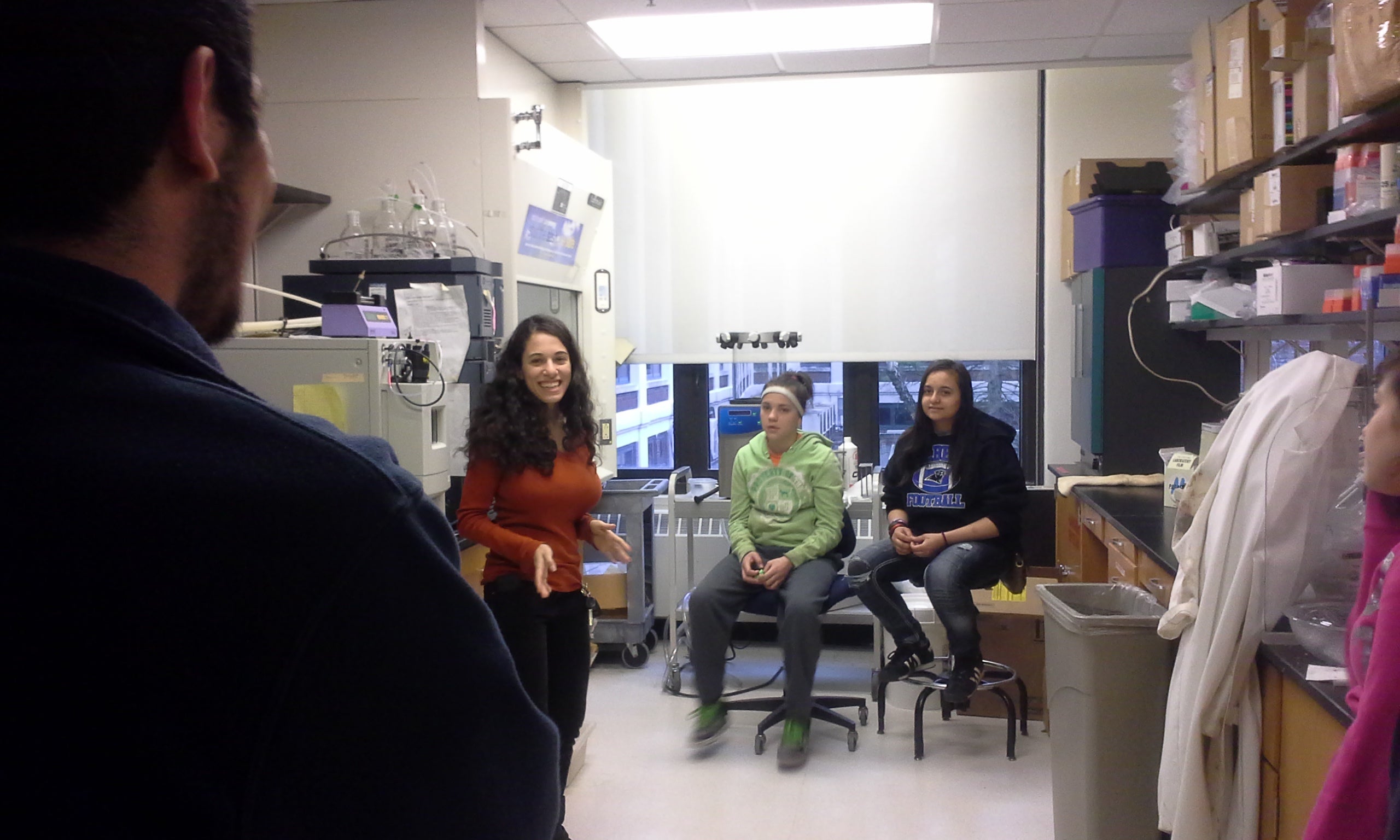
Master Gardeners of Western Wayne County
On October 2nd 2014, Mark gave a public lecture to members of the Master Gardeners of Western Wayne County (MGWWC). Facilitated by the extension program at Michigan State University, MGWWC is a an education and outreach program that focuses on growing plants in a variety of garden settings.
Mark’s talk focused on self-medication in animals, including how to use the Great Green Pharmacy to promote the health of animals in our gardens.
Lunch-And-Learn
On August 20 2014, Mark gave a public lecture to the Lunch-and Learn group at Petoskey Country Club. Lunch-and-Learn is sponsored by the University of Michigan Alumni Spirit Group and supports scholarships for incoming university students. Mark’s talk focused on self-medication in monarch butterflies and on actions that the public can take to help protect this iconic butterfly species.
Sheldon Academy of Innovative Learning in Fairfield California
Students have been using our work on self-medication in monarch butterflies for their class projects. Take a look at the wonderful stories and presentations the students have produced.
Cesar Tellez, room 26
Adrianna, room 26
Jasmien Villanueva, room 26
Mario Cruz, Fictional Argumentative Essay, Sick Sister Monarch
Victor, Sick Sister Monarch
Anisa Saralyn Garcia, room 26
Adrian Labrador, room 26
Mario Cruz, Fictional Narrative, My Butterfly Tummy Ache
Victor, My Butterfly Tummy Ache
Te’nyiah Ward
Adrianna
Emmanuel
Paulette
Aiyana Alarcon
tropical milkweed
Research on the Radio
Listen to a podcast from Michigan Radio about our work linking climate change to the population dynamics of moths in Finnish Lapland.






